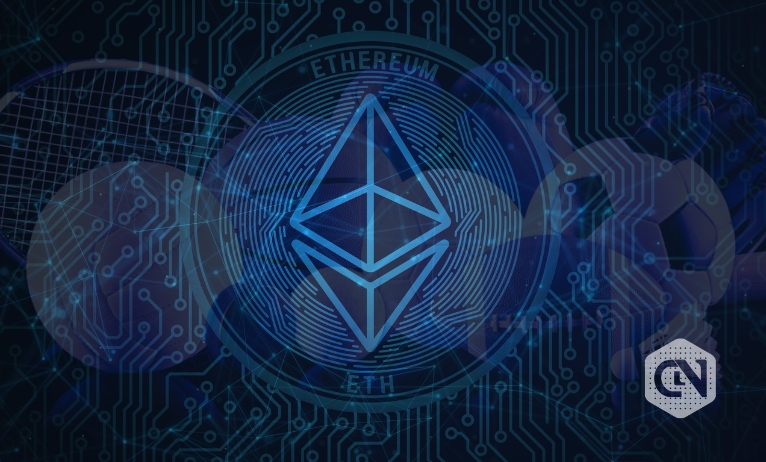Blockchain technology is a distributed ledger system that operates decentralized and securely across several computers to record transactions. Beyond cryptocurrencies, blockchain is used in several industries, such as voting, supply chain management, identity verification, and medical records. By removing middlemen, its transparent and unchangeable nature improves data security, lowers fraud, and boosts efficiency.
Automatic, self-executing contracts are made possible by smart contracts, and cutting-edge financial services are provided via decentralized finance (DeFi) systems. Blockchain technology promises revolutionary answers for many real-world problems by revolutionizing industries’ efficiency, trust, and transparency.
Ethereum as a Prominent Blockchain Platform
Ethereum is a well-known blockchain technology that allows developers to create self-executing agreements and decentralized apps (dApps) thanks to its smart contract capabilities.
Ethereum provides the gaming business with several advantages:
Decentralization: Ethereum makes decentralized gaming possible, giving users complete control over their gaming experience and ownership of in-game items without depending on centralized authorities.
Interoperability: Due to Ethereum’s interoperability with other blockchain networks and currencies, gaming experiences and assets may be seamlessly integrated across many platforms, boosting player engagement and accessibility.
Advertisement
NFTs: A thriving ecosystem of digital collectibles and in-game economies is fostered by Ethereum’s support for non-fungible tokens (NFTs), which allow the production and ownership of unique digital assets within games, such as characters, rare objects, or virtual real estate.
Immutable Transactions: For developers as well as players, Ethereum’s unchangeable ledger promotes trust and security by guaranteeing clear and unchangeable transactions.
Smart Contracts: By automating in-game agreements and transactions like item selling, reward distribution, and provably fair gaming mechanics, Ethereum’s smart contract feature decreases the need for middlemen and boosts efficiency.
The gaming business has the potential to benefit greatly from Ethereum’s rising prominence in the blockchain arena, which is altering ownership patterns, player experiences, and monetization techniques.
Ethereum Blockchain Applications in Sports and Esports
Blockchain-based Ethereum apps are revolutionizing the sports and esports sectors by introducing creative solutions that improve fan interaction, optimize processes, and generate new revenue streams.
- Fan Tokens: Fan tokens empower fans with ownership and decision-making rights, fostering deeper engagement with sports teams. Real-world examples include Socios, where fans can purchase and trade tokens to access exclusive content and voting rights.
- Digital Trading Cards and Collectibles (NFTs): Ethereum-based NFTs enable the creation and trading of unique digital assets like player cards and collectibles. Notable examples include NBA Top Shot, where users can buy, sell, and trade digital basketball collectibles, leveraging blockchain’s transparency and scarcity to create value.
- Fan Loyalty and Engagement Platforms: Ethereum-based platforms enhance fan loyalty and engagement through innovative features like rewards, challenges, and interactive experiences. Integrating Ethereum sports betting features can further incentivize fan participation, fostering a vibrant community around sports events. Various Ethereum-based sports betting events offer rewards for active participation, such as voting on match outcomes or engaging with team content.
- Blockchain-Based Ticketing Systems: Ethereum’s decentralized nature ensures transparency and security in ticketing systems, mitigating issues like scalping and fraud. Ethereum’s blockchain leverages to authenticate tickets, ensuring fair access and preventing counterfeit tickets.
- Decentralized Esports Ecosystems: Ethereum facilitates the development of decentralized esports platforms, empowering players and fans with ownership and control over in-game assets and tournaments. Free–to–play card games create decentralized gaming ecosystems where players can compete, trade assets, and earn rewards on Ethereum’s blockchain.
These applications demonstrate how Ethereum may transform traditional sports and esports, opening the door to a more engaging and inclusive spectator experience.
Conclusion
Innovations on the Ethereum blockchain are redefining the sports and esports sectors by bringing decentralized solutions that improve fan interaction, permit digital asset ownership, and optimize processes.
Advertisement
Fans, teams, and organizers now have more ways to engage, take part, and make money in these quickly developing industries thanks to Ethereum’s applications, which range from fan tokens and digital collectibles to decentralized ecosystems and transparent ticketing systems.
The sports and esports industries are positioned to adopt increased transparency, inclusion, and innovation by utilizing Ethereum’s capabilities, thereby influencing the future of fan experiences and industry operations.







